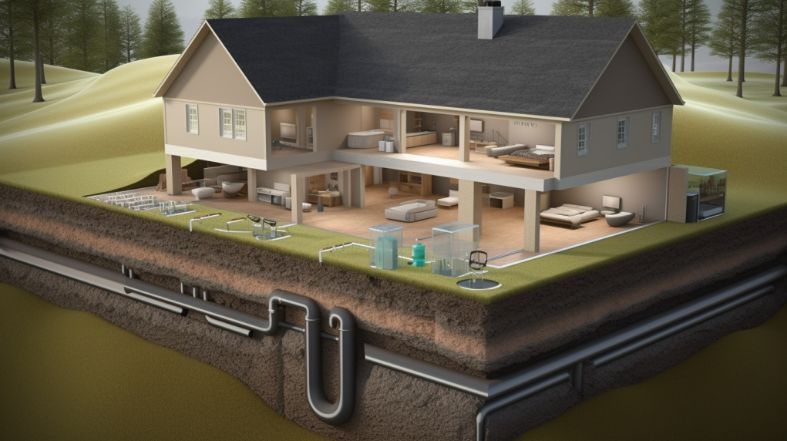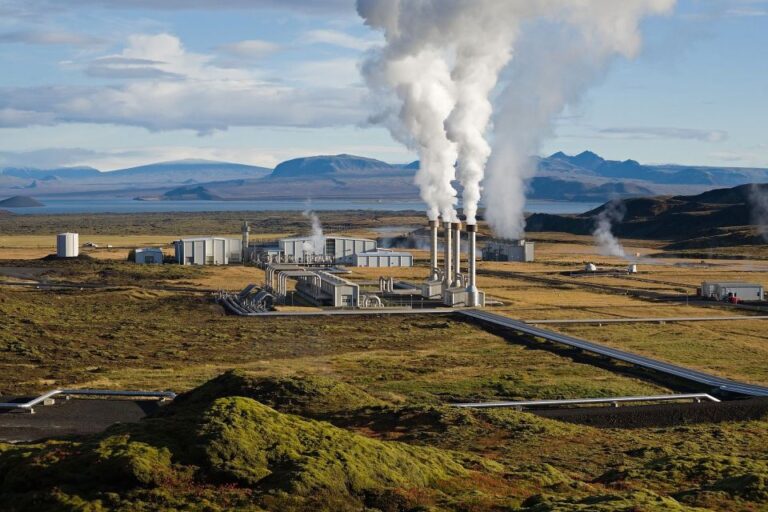5 Reasons Why Geothermal Energy is the Future
Geothermal energy is a renewable energy source that generates power by harnessing heat from the Earth’s interior. It is a clean and sustainable option to limited fossil fuels that add to climate change. As the world’s population grows, so will the demand for energy, making it critical to consider different energy sources such as geothermal energy.

Here are five reasons why geothermal energy is the future of renewable energy. For starters, it is a dependable energy source that can provide a steady amount of power. Second, it is a pure energy source with no greenhouse gas pollution. Third, it is inexpensive and can help you save money in the long term. Fourth, it is flexible because it can be used for both heating and chilling. Finally, it is widespread and can be found in many areas of the globe.
Table of Contents
A Renewable and Sustainable Energy Source
Geothermal energy is a renewable and safe energy source that derives its heat from the Earth’s center. Because it is continuously replenished by the Earth’s natural processes, this energy source is deemed renewable, making it a dependable and long-term answer to our energy requirements.

Geothermal energy is far more durable than other energy sources such as natural fuels and nuclear energy. Fossil fuels are limited and quickly diminishing resources, and their production and use have major environmental consequences. Nuclear energy, on the other hand, generates toxic debris that can contaminate the environment for thousands of years.
Geothermal energy, on the other hand, has a significantly reduced environmental effect and emits no harmful pollutants. It is a pure and renewable energy source that has the potential to decrease our reliance on fossil fuels while also mitigating the impacts of climate change.
One of geothermal energy’s most important advantages is its ability to decrease carbon pollution. We can greatly decrease our carbon footprint and help fight climate change by using geothermal energy instead of fossil fuels. Geothermal energy has the ability to decrease global carbon emissions by up to 12%, according to the International Energy Agency.
Several nations, including Iceland, the United States, and Kenya, have effectively implemented geothermal energy. Iceland, in particular, has made significant advancements in the use of geothermal energy to power its houses and businesses. More than 90% of Iceland’s homes are heated with geothermal energy, and the nation has emerged as a global champion in geothermal technology and study.
Finally, geothermal energy is a green and safe energy source with the potential to transform the way we run our houses and businesses. Geothermal energy can help create a cleaner and more sustainable future for future children by decreasing our reliance on fossil fuels and alleviating the impacts of climate change.
A Cost-Effective Solution
Geothermal energy is a is a low-cost option that can provide a consistent supply of energy in the long term. In this piece, we will look at how geothermal energy can be more cost-effective than other energy sources.

Fossil Fuels, Solar, and Wind vs. Geothermal Energy
Coal and gasoline, for example, are nonrenewable resources that are becoming increasingly costly to extract. Solar and wind energy are renewable resources, but they demand substantial infrastructure and technological investment. Geothermal energy, on the other hand, is a renewable supply with minimum building requirements.
Reducing Consumer Energy Bills
Geothermal energy can help customers save money on their energy expenses by offering a consistent source of energy that is not susceptible to price changes. Unlike conventional fuels, which have volatile prices, geothermal energy is a consistent source of energy that can provide long-term cost benefits. Furthermore, geothermal energy systems require little upkeep, which can help customers save money.
Several businesses and nations have already recognized geothermal energy’s cost-saving benefits. Google’s data center in Finland, for example, is powered by geothermal energy, which has cut its energy expenses by 40%. Iceland is another nation that has embraced geothermal energy, with geothermal energy accounting for more than 90% of its electricity. As a consequence, Iceland has some of Europe’s lowest energy prices.
Finally, geothermal energy is a low-cost option that can provide a consistent source of energy in the long term. It is a renewable substance that is abundant and needs little infrastructure. Geothermal energy is a viable option to fossil fuels, solar, and wind energy because it lowers customer energy costs and provides long-term cost savings.
Reliable and Consistent
Geothermal energy is a sustainable energy source produced by the heat of the earth’s center. Unlike other renewable energy sources such as sun and wind, geothermal energy is not affected by weather and is accessible 24 hours a day, seven days a week.
Geothermal energy is more dependable and constant than solar and wind energy. Solar energy is reliant on the amount of sunshine available, which changes depending on the time of day and atmospheric conditions. Wind energy is similarly reliant on wind supply, which can be unexpected and inconsistent. Geothermal energy, on the other hand, is produced by the consistent and dependable heat of the earth’s core.
Geothermal energy can provide baseload power, which is the bare minimum of power needed to satisfy a community’s energy needs. Baseload electricity is critical for ensuring a stable and dependable energy source. Geothermal energy can provide baseload power because it is accessible 24 hours a day and can produce electricity on a consistent basis.
Several nations have used geothermal energy effectively for baseload power. Iceland is a prime example of a nation that has used geothermal energy effectively for baseload electricity. Iceland produces more than 25% of its power from geothermal energy and has reduced its reliance on fossil fuels. The United States, the Philippines, and Kenya are among the other nations that have effectively used geothermal energy for baseload power.
Finally, geothermal energy is a consistent and reliable form of energy that can provide baseload electricity. Geothermal energy is more dependable and constant than other renewable energy sources such as sun and wind. Several nations have effectively used geothermal energy for baseload electricity, reducing their reliance on fossil fuels while maintaining a steady and dependable energy supply.
A Job Creation Powerhouse
Geothermal energy is a renewable energy source with the ability to generate employment in a variety of industries. Geothermal energy, unlike fossil fuels, is a pure and sustainable form of energy that can be used to power houses, companies, and industries. In this piece, we will look at how geothermal energy can help generate jobs and compare it to other types of energy.
How Geothermal Energy Can Support Job Creation
Geothermal energy has the potential to generate employment in a variety of industries, including building, engineering, and maintenance. Geothermal power plant building necessitates the use of experienced employees such as electricians, welders, and pipefitters. Geothermal energy projects also help the engineering industry because they require geologists, hydrologists, and geophysicists to assess the project’s feasibility. Geothermal power facility upkeep necessitates the use of experienced employees such as mechanics, technicians, and operators.

Analysis of Alternative Energy Sources
Geothermal energy has a greater capacity for employment creation than other energy sources such as fossil fuels. Although it takes fewer employees to harvest and move fossil fuels, they have a higher environmental effect and are not viable. Geothermal energy, on the other hand, needs more workers to build and run power plants, but it has a smaller environmental effect and is more sustainable.
Examples of Geothermal Energy Job Creation
Geothermal energy projects have generated employment in a number of nations. Geothermal energy supplies over 25% of Iceland’s electricity and has generated employment in a variety of industries. Geothermal energy projects in the United States have also generated jobs, with over 3,700 people working in the geothermal sector. Kenya has also engaged in geothermal energy, which has resulted in the creation of over 5,000 employment.
Finally, geothermal energy is a job-creation powerhouse with the ability to generate employment in a variety of industries. Geothermal energy has a greater possibility for employment creation than other energy sources and is a more sustainable form of energy. Geothermal energy initiatives have already generated employment in Iceland, the United States, and Kenya, and more nations should engage in this green energy source to create jobs and support sustainable development.
Versatility
Geothermal energy is a flexible energy source that can be used in a variety of industries, including power, heating, and ventilation. Geothermal energy, unlike other energy sources such as fossil fuels, solar, and wind, can provide a consistent and dependable supply of energy.
Applications in a Variety of Industries
Geothermal energy can be used to produce electricity by driving generators with steam or heated water from subterranean pools. It can also be used to heat and cool structures by transferring heat from the earth to the building in the winter and vice versa in the summer using heat pumps. Geothermal energy can also be used in commercial operations such as drying vegetables or heating greenhouses.
Analysis of Alternative Energy Sources
In comparison to fossil fuels, geothermal energy is a renewable and safe form of energy that emits no greenhouse gases. Solar and wind energy are also renewable energy sources, but they are weather reliant and can be sporadic. In contrast, geothermal energy can provide a consistent and dependable supply of energy.
Application in Various Regions
Geothermal energy can be used both in cities and in remote regions. It can be used for heating and cooling structures in cities, and farming and commercial operations in remote regions. Geothermal energy can also be used in seismically active areas where other energy sources may be insufficient.
Conclusion
Finally, geothermal energy is unquestionably the future of renewable energy. The five reasons addressed in this piece highlight geothermal energy’s enormous potential to satisfy our energy requirements while lowering our carbon footprint. Individuals and governments must move to engage in geothermal energy and prioritize it in our energy balance.






